Eps Machine - Dongshen
Hangzhou Dongshen Machinery Engineering Co., Ltd stands as a beacon of excellence in the EPS machinery industry, catering to a global clientele with high-quality products and outstanding service. Specializing in various EPS machines, including EPS Preexpanders, EPS Block Molding Machines, and particularly the eps shape molding machine, Dongshen has built a solid reputation for reliability and innovation.
Our strength lies not only in our advanced machinery but also in our comprehensive support to clients. We offer complete turn-key projects, from designing new EPS factories to upgrading existing ones to enhance production capacity and energy efficiency. Our EPS molding machine line, including the 2200E EPS Vacuum Casting Machine for floor heating panels and the EPS floor heating panel laminating machine, exemplifies our commitment to cutting-edge technology and customer-centric solutions.
Additionally, Dongshen excels in producing custom EPS molds and spare parts, compatible with machines from industry leaders in Germany, Korea, Japan, and Jordan. We also pioneer in manufacturing EPS raw material equipment, ensuring seamless production processes with our state-of-the-art reactors, washing tanks, and sieving machines.
Trusted by clients for over a decade, Dongshen ensures quality through meticulous inspections and strategic sourcing. Our clients regard us as their dependable partner in China, a relationship we deeply value and aim to nurture through consistent excellence and honesty in our business dealings.
Our strength lies not only in our advanced machinery but also in our comprehensive support to clients. We offer complete turn-key projects, from designing new EPS factories to upgrading existing ones to enhance production capacity and energy efficiency. Our EPS molding machine line, including the 2200E EPS Vacuum Casting Machine for floor heating panels and the EPS floor heating panel laminating machine, exemplifies our commitment to cutting-edge technology and customer-centric solutions.
Additionally, Dongshen excels in producing custom EPS molds and spare parts, compatible with machines from industry leaders in Germany, Korea, Japan, and Jordan. We also pioneer in manufacturing EPS raw material equipment, ensuring seamless production processes with our state-of-the-art reactors, washing tanks, and sieving machines.
Trusted by clients for over a decade, Dongshen ensures quality through meticulous inspections and strategic sourcing. Our clients regard us as their dependable partner in China, a relationship we deeply value and aim to nurture through consistent excellence and honesty in our business dealings.
Products
-
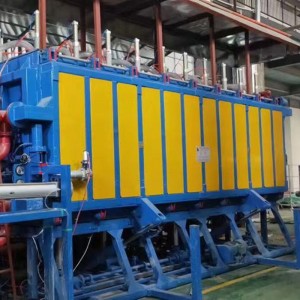
Full automatic EPS expanded polystyrene styrofoam block sheet making machine
-
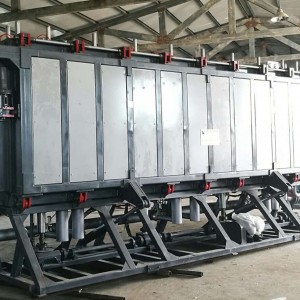
Polystyrene block moulding machine with vacuum
-
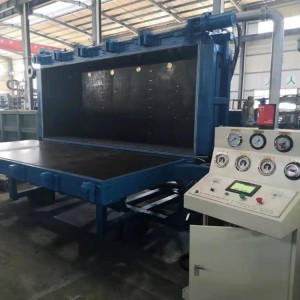
PB2000V-PB6000V Vacuum type EPS block molding machine
-
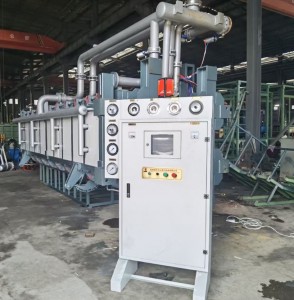
Expanded polystyrene block foam machine
-
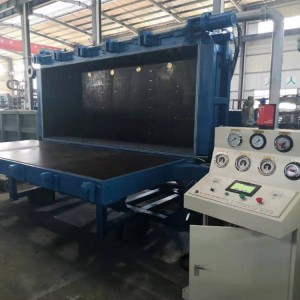
EPS block machine with vacuum
-
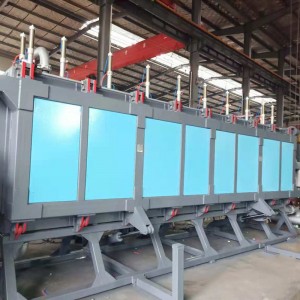
PB2000A-PB6000A Air cooling type EPS block molding machine
-
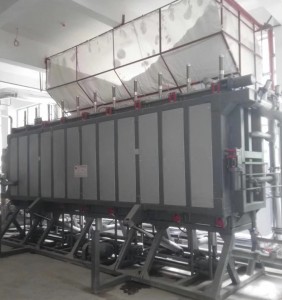
Automatic China EPS block molding machine
-
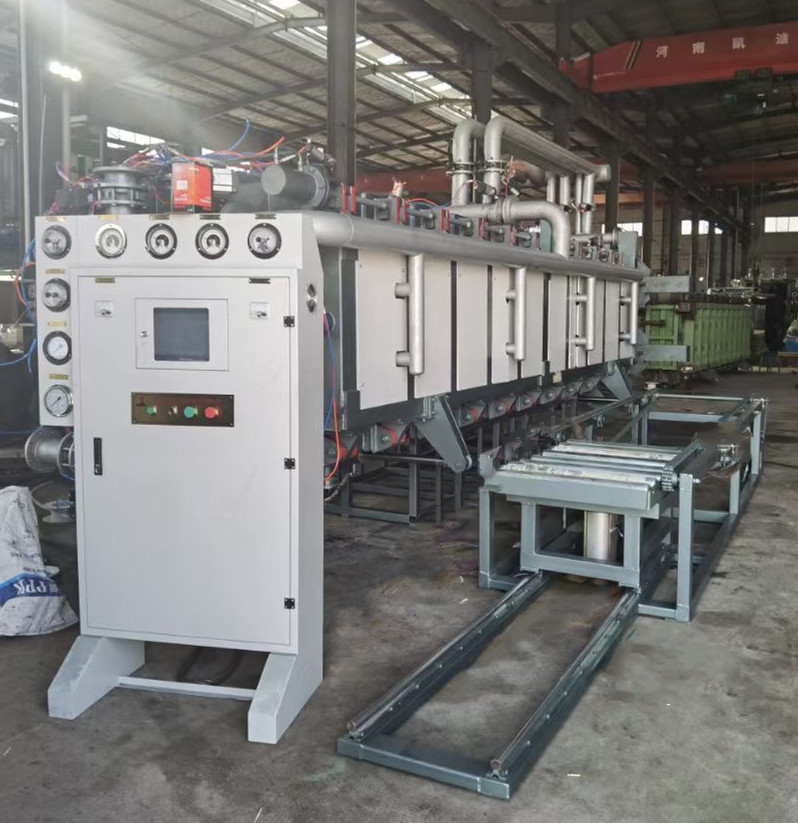
EPS styrofoam block molding machine
-
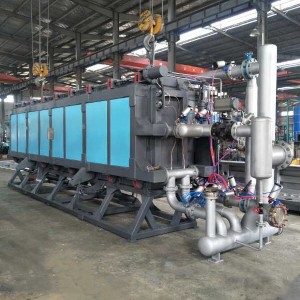
Expanded Polystyrene Foam Block Making Machine
-
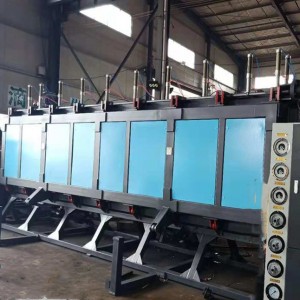
Thermocol Plate Making Machine
-
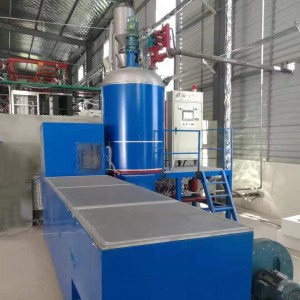
SPY90-SPY120 Continuous EPS Pre expander
-
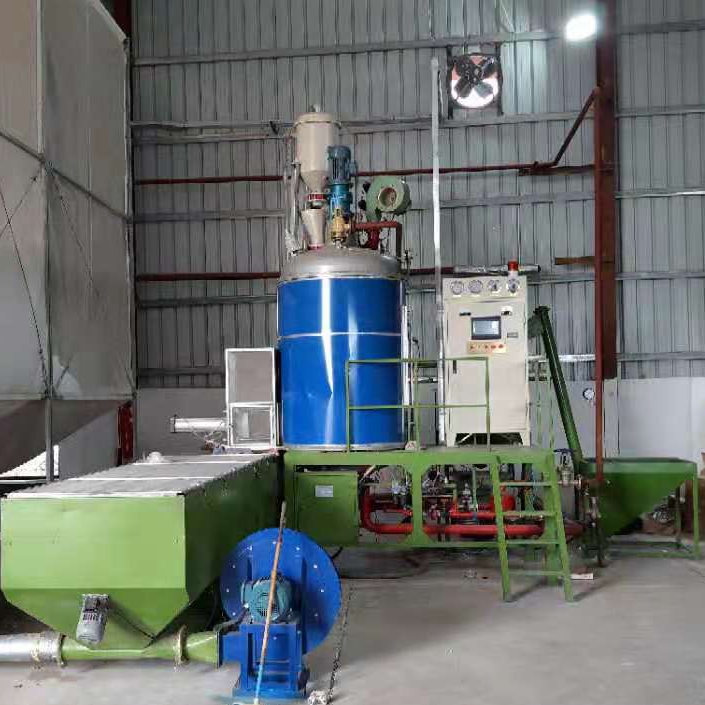
EPS continuous granules making machine
Products FAQ
What is an EPS machine?▾
EPS machines (emergent polystyrene machines) play a vital role in the production of polystyrene foams, which are widely known for their applications in the field of packaging and insulation. These machines are sophisticated devices designed to convert raw polystyrene beads into foams that are then used in various industries. Understanding the intricacies of EPS machines is crucial for businesses involved in manufacturing, packaging and construction.
● What is an EPS machine?
EPS machines and their components
The EPS machine is designed to convert flexible polystyrene beads into foam products through a series of heating, expansion and forming processes. A full set of EPS equipment usually consists of several integral components, each of which plays a specific role in the production line. These components are:
- Pre-foaming machine: This is the initial stage where the raw polystyrene beads are exposed to steam to soften and expand them. -
Block forming machines: These machines are crucial because they shape foamed beads into large pieces that can then be cut and formed according to a variety of specifications. -
Automatic forming machines: These are professional EPS shape forming machines that convert pre-bubbling beads into specific shapes and sizes to suit specific applications. -
Cutter: After forming, the foam is cut to the desired shape and size, ready for the final application. -
Recycling pelletizer: This component ensures sustainable production by recycling waste polystyrene into usable beads.
● EPS molding process
Pre-bubbling stage
EPS forming process starts from the pre-foaming stage. At this stage, the raw polystyrene beads are placed in the pre-foaming machine for steam treatment. The heat generated by the steam softens and expands the beads, significantly increasing their volume. This initial expansion is essential for forming the porous structure of the foam.
Heating and pressurizing
After pre-foaming, the beads are heated and pressurized. A low boiling liquid blowing agent is added to the beads. Under heat and pressure, the blowing agent penetrates into the beads, causing further expansion and the formation of a foam structure. This stage is crucial to ensure that the beads achieve the required density and structural integrity.
Cooling and aging
After heating, the expanded beads undergo a cooling phase. As they cool, the pentane used in the blowing agent liquefies, creating a partial vacuum inside the beads. This vacuum contributes to the final size and density of the bead. The beads are then aged to stabilize them before moving on to the next stage.
EPS forming machine
One of the most specialized components in the EPS mechanical range is the EPS forming machine. These machines are designed for high precision, enabling manufacturers to produce custom shapes and sizes based on specific industry needs. Whether used for packaging precision electronics or building insulation panels, EPS formers ensure that foam products meet stringent quality standards and precise specifications.
Cutting and recycling
After the foam block is formed, the cutter cuts it into various shapes and sizes. This step is crucial for customizing the foam according to its end use, whether in packaging, construction, or other applications. Finally, any waste from the pelletizer process is recycled, which reprocesses polystyrene waste into reusable beads, thus promoting sustainable manufacturing methods.
● Applications and benefits
EPS machines facilitate the production of a wide range of versatile polystyrene foam products. From packaging materials to protect fragile goods during transportation to insulation panels to improve the energy efficiency of buildings, EPS foam has a wide range of uses. The benefits of using an EPS machine include cost effectiveness, material versatility, and the ability to produce custom shapes and sizes through an EPS forming machine.
In short, EPS machines are essential in the production of explosible polystyrene foams and play a key role in various industries. Understanding their operation, components, and the entire molding process provides insight into the efficiency and capabilities of EPS manufacturing. With components such as EPS formers, these systems provide accurate, sustainable and versatile foam production solutions.
● What is an EPS machine?
EPS machines and their components
The EPS machine is designed to convert flexible polystyrene beads into foam products through a series of heating, expansion and forming processes. A full set of EPS equipment usually consists of several integral components, each of which plays a specific role in the production line. These components are:
- Pre-foaming machine: This is the initial stage where the raw polystyrene beads are exposed to steam to soften and expand them. -
Block forming machines: These machines are crucial because they shape foamed beads into large pieces that can then be cut and formed according to a variety of specifications. -
Automatic forming machines: These are professional EPS shape forming machines that convert pre-bubbling beads into specific shapes and sizes to suit specific applications. -
Cutter: After forming, the foam is cut to the desired shape and size, ready for the final application. -
Recycling pelletizer: This component ensures sustainable production by recycling waste polystyrene into usable beads.
● EPS molding process
Pre-bubbling stage
EPS forming process starts from the pre-foaming stage. At this stage, the raw polystyrene beads are placed in the pre-foaming machine for steam treatment. The heat generated by the steam softens and expands the beads, significantly increasing their volume. This initial expansion is essential for forming the porous structure of the foam.
Heating and pressurizing
After pre-foaming, the beads are heated and pressurized. A low boiling liquid blowing agent is added to the beads. Under heat and pressure, the blowing agent penetrates into the beads, causing further expansion and the formation of a foam structure. This stage is crucial to ensure that the beads achieve the required density and structural integrity.
Cooling and aging
After heating, the expanded beads undergo a cooling phase. As they cool, the pentane used in the blowing agent liquefies, creating a partial vacuum inside the beads. This vacuum contributes to the final size and density of the bead. The beads are then aged to stabilize them before moving on to the next stage.
EPS forming machine
One of the most specialized components in the EPS mechanical range is the EPS forming machine. These machines are designed for high precision, enabling manufacturers to produce custom shapes and sizes based on specific industry needs. Whether used for packaging precision electronics or building insulation panels, EPS formers ensure that foam products meet stringent quality standards and precise specifications.
Cutting and recycling
After the foam block is formed, the cutter cuts it into various shapes and sizes. This step is crucial for customizing the foam according to its end use, whether in packaging, construction, or other applications. Finally, any waste from the pelletizer process is recycled, which reprocesses polystyrene waste into reusable beads, thus promoting sustainable manufacturing methods.
● Applications and benefits
EPS machines facilitate the production of a wide range of versatile polystyrene foam products. From packaging materials to protect fragile goods during transportation to insulation panels to improve the energy efficiency of buildings, EPS foam has a wide range of uses. The benefits of using an EPS machine include cost effectiveness, material versatility, and the ability to produce custom shapes and sizes through an EPS forming machine.
In short, EPS machines are essential in the production of explosible polystyrene foams and play a key role in various industries. Understanding their operation, components, and the entire molding process provides insight into the efficiency and capabilities of EPS manufacturing. With components such as EPS formers, these systems provide accurate, sustainable and versatile foam production solutions.
What is EPS mechanical?▾
Expanded Polystyrene (EPS) mechanical applications encompass a diverse range of industries, providing vital solutions through its unique properties and versatile uses. As a professional author, I will delve into the distinct attributes of EPS and its significance in modern engineering and manufacturing sectors, with a special focus on the role of EPS molding machines in crafting these materials.
Expanded Polystyrene (EPS) is a rigid, closed-cell foam material derived from solid polystyrene beads. These beads are impregnated with a foaming agent and contain an expansion gas, resulting in a lightweight and robust thermoplastic foam. The closed-cell structure, comprising 98% air, significantly reduces its thermal conductivity, making EPS an excellent insulator. This composition also lends EPS a lower density and higher load-bearing strength per weight compared to non-foamed polystyrene plastics, enhancing its versatility in various mechanical applications.
EPS boasts several mechanical advantages, including resistance to bending and compression, ensuring durability in load-bearing situations. Its lightweight nature does not compromise its strength, making it an ideal material for applications requiring both stability and minimal weight. Additionally, its poor heat conductivity makes it a preferred choice in insulation, contributing to energy efficiency in buildings and temperature-sensitive environments.
In the construction and architectural sectors, EPS is extensively used for its insulating properties and structural integrity. It serves as a core material in sandwich panels, providing thermal insulation and stability. EPS blocks and sheets are also used in road construction to prevent frost heave in cold climates, ensuring the longevity and reliability of roadways. Its adaptability allows architects to design intricate shapes and structures, enhancing both the aesthetic and functional aspects of buildings.
EPS plays a crucial role in the automotive industry, primarily in the manufacturing of vehicle components that require lightweight yet strong materials. It is used in the creation of car seats, interiors, and even certain body parts, contributing to the overall reduction in vehicle weight, which in turn enhances fuel efficiency. The shock-absorbing properties of EPS also make it an essential material in safety applications, such as in bumpers and cushioning for impact protection.
EPS molding machines are pivotal in the production of EPS products, enabling the precise and efficient shaping of polystyrene beads into the desired forms. These machines work by applying heat and pressure to expand the beads and mold them into specific shapes, tailored to meet the requirements of various applications. The process involves several stages, including pre-expansion, aging, molding, and cutting, each meticulously controlled to ensure the quality and consistency of the final product.
Advancements in EPS molding technology have significantly improved the efficiency and capabilities of these machines. Modern EPS molding machines are equipped with sophisticated control systems that allow for precise temperature and pressure adjustments, ensuring optimal expansion and molding. These advancements have also led to reduced energy consumption and shorter cycle times, enhancing the overall productivity and sustainability of EPS manufacturing.
EPS molding machines are utilized across different industries to produce a wide array of products. In construction, they manufacture insulating panels, blocks, and shapes tailored for specific building requirements. In the automotive sector, these machines create components that contribute to vehicle safety and efficiency. Additionally, the packaging industry relies on EPS molding machines to produce protective packaging materials that safeguard products during transportation and storage.
In conclusion, Expanded Polystyrene (EPS) is a versatile and indispensable material in various mechanical applications, offering unique advantages in terms of strength, insulation, and weight. The role of EPS molding machines is crucial in the efficient and precise manufacturing of EPS products, driving innovation and sustainability across multiple industries. As technology continues to evolve, the applications and benefits of EPS are poised to expand further, solidifying its position as a key material in modern engineering and manufacturing.
Understanding Expanded Polystyrene (EPS)
● Properties and Composition of EPS
Expanded Polystyrene (EPS) is a rigid, closed-cell foam material derived from solid polystyrene beads. These beads are impregnated with a foaming agent and contain an expansion gas, resulting in a lightweight and robust thermoplastic foam. The closed-cell structure, comprising 98% air, significantly reduces its thermal conductivity, making EPS an excellent insulator. This composition also lends EPS a lower density and higher load-bearing strength per weight compared to non-foamed polystyrene plastics, enhancing its versatility in various mechanical applications.
● Advantages of EPS in Mechanical Applications
EPS boasts several mechanical advantages, including resistance to bending and compression, ensuring durability in load-bearing situations. Its lightweight nature does not compromise its strength, making it an ideal material for applications requiring both stability and minimal weight. Additionally, its poor heat conductivity makes it a preferred choice in insulation, contributing to energy efficiency in buildings and temperature-sensitive environments.
Applications of EPS in Industry
● Construction and Architecture
In the construction and architectural sectors, EPS is extensively used for its insulating properties and structural integrity. It serves as a core material in sandwich panels, providing thermal insulation and stability. EPS blocks and sheets are also used in road construction to prevent frost heave in cold climates, ensuring the longevity and reliability of roadways. Its adaptability allows architects to design intricate shapes and structures, enhancing both the aesthetic and functional aspects of buildings.
● Automotive Industry
EPS plays a crucial role in the automotive industry, primarily in the manufacturing of vehicle components that require lightweight yet strong materials. It is used in the creation of car seats, interiors, and even certain body parts, contributing to the overall reduction in vehicle weight, which in turn enhances fuel efficiency. The shock-absorbing properties of EPS also make it an essential material in safety applications, such as in bumpers and cushioning for impact protection.
The Role of EPS Molding Machines
EPS molding machines are pivotal in the production of EPS products, enabling the precise and efficient shaping of polystyrene beads into the desired forms. These machines work by applying heat and pressure to expand the beads and mold them into specific shapes, tailored to meet the requirements of various applications. The process involves several stages, including pre-expansion, aging, molding, and cutting, each meticulously controlled to ensure the quality and consistency of the final product.
● Technological Advancements in EPS Molding
Advancements in EPS molding technology have significantly improved the efficiency and capabilities of these machines. Modern EPS molding machines are equipped with sophisticated control systems that allow for precise temperature and pressure adjustments, ensuring optimal expansion and molding. These advancements have also led to reduced energy consumption and shorter cycle times, enhancing the overall productivity and sustainability of EPS manufacturing.
● Applications of EPS Molding Machines
EPS molding machines are utilized across different industries to produce a wide array of products. In construction, they manufacture insulating panels, blocks, and shapes tailored for specific building requirements. In the automotive sector, these machines create components that contribute to vehicle safety and efficiency. Additionally, the packaging industry relies on EPS molding machines to produce protective packaging materials that safeguard products during transportation and storage.
In conclusion, Expanded Polystyrene (EPS) is a versatile and indispensable material in various mechanical applications, offering unique advantages in terms of strength, insulation, and weight. The role of EPS molding machines is crucial in the efficient and precise manufacturing of EPS products, driving innovation and sustainability across multiple industries. As technology continues to evolve, the applications and benefits of EPS are poised to expand further, solidifying its position as a key material in modern engineering and manufacturing.
Is EPS the same as styrofoam?▾
Expanded Polystyrene (EPS) and Styrofoam are terms often used interchangeably, leading to confusion among consumers and professionals alike. However, it is crucial to understand the distinct differences between these two materials to utilize them effectively and appropriately in various applications.
Expanded Polystyrene, commonly referred to as EPS, is a lightweight, rigid, and versatile plastic foam. It is created by expanding polystyrene beads with steam and pressure, which bond together to form a solid structure. EPS is composed of 98% air, making it incredibly lightweight and an excellent insulator. Furthermore, EPS is highly durable, resistant to moisture, and recyclable, adding to its list of beneficial properties.
Styrofoam, on the other hand, is a trademarked name for a specific type of closed-cell extruded polystyrene foam. This particular form of polystyrene foam is engineered for thermal insulation and craft applications. While Styrofoam shares some characteristics with EPS, such as being lightweight and an insulator, it is not the same material. The term "Styrofoam" often becomes a generic descriptor for any foam product because of its widespread use and recognition, but technically, it refers to just one type of extruded polystyrene foam.
The primary distinction between EPS and Styrofoam lies in their manufacturing processes and resulting structural attributes. EPS is made by expanding polystyrene beads, which creates a more rigid and less dense material. In contrast, Styrofoam is produced through an extrusion process, resulting in a smoother, denser, and more consistent foam structure.
EPS is utilized in a vast array of applications due to its physical properties. It is commonly used in packaging for its excellent shock-absorbing capabilities, ensuring the safe transport of fragile goods. Additionally, EPS is popular in the construction industry for wall, floor, and roof insulation, thanks to its low thermal conductivity and resistance to moisture. The material's versatility extends to disposable food containers, where it provides effective insulation for hot and cold beverages.
Styrofoam’s primary applications are in thermal insulation and crafting. Its closed-cell structure makes it an exceptional insulator, commonly used in building insulation boards. Additionally, due to its smooth surface and ease of cutting, Styrofoam is favored for craft projects and modeling.
One of the critical aspects of producing high-quality EPS products is the use of advanced EPS molding machines. These machines are designed to shape EPS beads into a variety of forms and sizes, catering to specific industry needs. The precision and efficiency of modern EPS molding machines ensure consistency in product density and structural integrity, essential for maintaining the material's desirable properties.
By using EPS molding machines, manufacturers can produce a wide range of products, from intricate packaging materials to large-scale insulation panels. The machines’ capabilities extend to customizing shapes and sizes, providing clients with tailored solutions that meet their exact specifications.
While EPS and Styrofoam are often confused, understanding their differences and specific applications is essential for making informed decisions in their use. EPS, a versatile and recyclable material, stands out for its use in packaging and insulation, whereas Styrofoam is specialized for thermal insulation and crafting purposes. Utilizing advanced EPS molding machines further enhances the production quality and efficiency, ensuring the continued utility and innovation of EPS products across various industries. Recognizing these distinctions enables better material selection and application, optimizing the benefits of both EPS and Styrofoam in their respective domains.
Understanding EPS and Styrofoam
● What is Expanded Polystyrene (EPS)?
Expanded Polystyrene, commonly referred to as EPS, is a lightweight, rigid, and versatile plastic foam. It is created by expanding polystyrene beads with steam and pressure, which bond together to form a solid structure. EPS is composed of 98% air, making it incredibly lightweight and an excellent insulator. Furthermore, EPS is highly durable, resistant to moisture, and recyclable, adding to its list of beneficial properties.
● What is Styrofoam?
Styrofoam, on the other hand, is a trademarked name for a specific type of closed-cell extruded polystyrene foam. This particular form of polystyrene foam is engineered for thermal insulation and craft applications. While Styrofoam shares some characteristics with EPS, such as being lightweight and an insulator, it is not the same material. The term "Styrofoam" often becomes a generic descriptor for any foam product because of its widespread use and recognition, but technically, it refers to just one type of extruded polystyrene foam.
Differences and Common Uses
● Distinguishing Factors
The primary distinction between EPS and Styrofoam lies in their manufacturing processes and resulting structural attributes. EPS is made by expanding polystyrene beads, which creates a more rigid and less dense material. In contrast, Styrofoam is produced through an extrusion process, resulting in a smoother, denser, and more consistent foam structure.
● Applications and Benefits
EPS is utilized in a vast array of applications due to its physical properties. It is commonly used in packaging for its excellent shock-absorbing capabilities, ensuring the safe transport of fragile goods. Additionally, EPS is popular in the construction industry for wall, floor, and roof insulation, thanks to its low thermal conductivity and resistance to moisture. The material's versatility extends to disposable food containers, where it provides effective insulation for hot and cold beverages.
Styrofoam’s primary applications are in thermal insulation and crafting. Its closed-cell structure makes it an exceptional insulator, commonly used in building insulation boards. Additionally, due to its smooth surface and ease of cutting, Styrofoam is favored for craft projects and modeling.
EPS Molding Machines
One of the critical aspects of producing high-quality EPS products is the use of advanced EPS molding machines. These machines are designed to shape EPS beads into a variety of forms and sizes, catering to specific industry needs. The precision and efficiency of modern EPS molding machines ensure consistency in product density and structural integrity, essential for maintaining the material's desirable properties.
By using EPS molding machines, manufacturers can produce a wide range of products, from intricate packaging materials to large-scale insulation panels. The machines’ capabilities extend to customizing shapes and sizes, providing clients with tailored solutions that meet their exact specifications.
Conclusion
While EPS and Styrofoam are often confused, understanding their differences and specific applications is essential for making informed decisions in their use. EPS, a versatile and recyclable material, stands out for its use in packaging and insulation, whereas Styrofoam is specialized for thermal insulation and crafting purposes. Utilizing advanced EPS molding machines further enhances the production quality and efficiency, ensuring the continued utility and innovation of EPS products across various industries. Recognizing these distinctions enables better material selection and application, optimizing the benefits of both EPS and Styrofoam in their respective domains.
